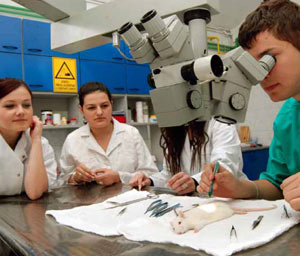University of Medicine and Pharmacy Cluj-Napoca
About the Academic Staff of the Iuliu Haţieganu University in Cluj-Napoca
The mission of the Faculty of Medicine consists of promoting outstanding services in teaching and research, in order to train graduates who are ready to participate successfully in the European job market, as well as to adapt themselves to the requirements of the market, and those of different health systems. At the end of the six-year degree, the students have to take a final exam. Afterwards, the students will have the following options (from which they can choose): laboratory training, a clinical specialisation, or scientific research in the framework of a Master’s degree or PhD programme.
From the beginning, the Faculty of Medicine in Cluj-Napoca tried to link the innovation in biomedical sciences with a humanistic approach, where special attention is paid to society and people’s health. The University has always tried to stay true to the following principles: the scientific professionalism and a substantial relation to people. This has helped the instruction at the Faculty of Medicine to gain a good reputation, confirmed by its excellent staff and the quality of its degrees.

Both by their own means, and the support of other funding programmes (such as Tempus, Phare, World Bank, etc.), the Faculty invested in staff and started a progressive restructuring of its degrees. Thanks to this process, the University counts now on young, professional teaching staff and on the new degrees, adapted to today’s requirements. With this, the University complies with all European requirements. In addition, teaching methods at the Faculty were updated to modern standards, without losing sight of the most important feature: giving the students a chance to put their skills into practice. This is what is most valued in the Faculty.
In the last few years, the University has expanded and developed considerably. Thanks to the addition of new departments at the university clinic, new spaces for clinical training have been created. Furthermore, some new subjects were introduced in the curriculum (Scientific Research Methods, Medical Bioethics, Medical Communication, Behavioural Research, etc.), which the University considers essential in order to achieve a modern, high-quality education.
But the introduction of new subjects in the curriculum is not the only modification in relation to academic development. Also the number of students was redistributed through the individual subjects, in order to do justice to the requisites of modern medicine and to guarantee a better balance between clinical subjects and the basic subjects. That is why attention is focused particularly on Cell and Molecular Biology, Medical Genetics, Biochemistry and Integrative Physiology during the first and second academic years. Other clinical subjects, such as Pathology or Pharmacology, were moved to the last years of the degree. Radiology and Clinical Imaging are learnt together with Anatomy, Internal Medicine, and Surgery. First Aid was moved to the first academic year, in order to enable the students to have contact with clinical medicine as early as possible.
 The Faculty has adjusted its study programmes to the Bologna Process and introduced the European Credit Transfer System (ECTS), which means that the qualifications granted by the Iuliu Hatienagu University are recognised in all European States. In addition to the degrees in Romanian, the Faculty has been offering degrees in English and French for more than 20 years. Since the introduction of these international degrees, the University was able to win a great amount of students from more than 25 different countries. The strategic aims of the Faculty concentrate on academic development, with the objective of adjusting to the requirements of modern medicine. Consequently, the University set up a variety of different projects which ensure the necessary support for further improvements of the study programmes. Furthermore, it will also ensure the development of a medical training system based on the needs of the students and highly qualified teaching staff.
The Faculty has adjusted its study programmes to the Bologna Process and introduced the European Credit Transfer System (ECTS), which means that the qualifications granted by the Iuliu Hatienagu University are recognised in all European States. In addition to the degrees in Romanian, the Faculty has been offering degrees in English and French for more than 20 years. Since the introduction of these international degrees, the University was able to win a great amount of students from more than 25 different countries. The strategic aims of the Faculty concentrate on academic development, with the objective of adjusting to the requirements of modern medicine. Consequently, the University set up a variety of different projects which ensure the necessary support for further improvements of the study programmes. Furthermore, it will also ensure the development of a medical training system based on the needs of the students and highly qualified teaching staff.
All of this was possible thanks to external cooperation, as well as the experience gained by the University throughout the years. The quality of teaching in the Faculty is reflected by the results obtained by their graduates in the national specialist exams in the last year, as well as by the degree of adjustment achieved by young specialists with regard to the requirements of the best hospitals in Europe and other continents.
 Upcoming free appointments:
Upcoming free appointments:








